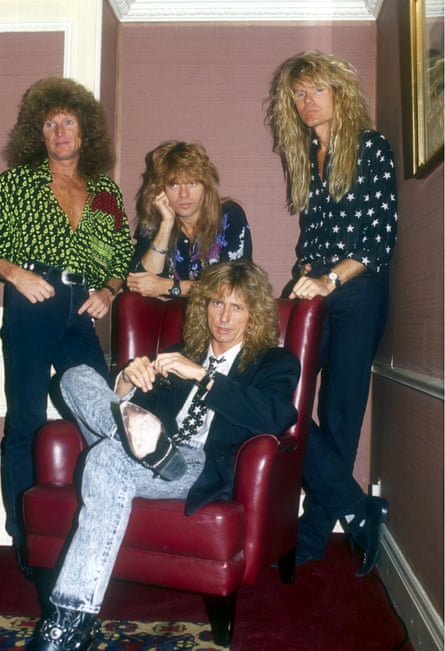What sounds awfully like Lord Flashheart from Blackadder is booming down the phone. Well, actually he’s singing. “Michael Hann, Michael Hann, riding through the glen,” he trills, to the tune of the ancient Robin Hood TV theme. “Michael Hann, Michael Hann, with his band of men!” He stops and laughs, a great raucous Huzzah! of a laugh. Welcome to the world of David Coverdale, the man who went straight from selling clothes in a North Yorkshire boutique to fronting Deep Purple; the man who cheerfully describes himself as a “cocksman”; the man whose band Whitesnake became huge in America in the 1980s by the simple expedient of having a beautiful woman writhe about on a car bonnet in a video.
But first, some words about bears. “We have a mama bear that comes every spring,” says Coverdale, who lives high in the Sierra Nevada overlooking Lake Tahoe. “And every year she has two new cubs. She’s probably 600lb, and the cubs just play in the garden. It’s glorious to see.” The downside is that sometimes the bears don’t stay in the garden – they come into the house. “Anybody who tells you you’re going to freak a bear out – basically a Volkswagen with a fur coat on – by banging a spatula on a saucepan must be eating too many mushrooms. The only thing I’ve found to chase them out is airhorns.” He proceeds to tell a long story involving him and his wife watching Downton Abbey and wandering upstairs at its end. “And I swear it’s comical: this fucking big beautiful black bear’s head just turns round the corner from the kitchen, looking like, ‘Yes?’ My wife assures me I turned into Richard Burton in Beckett: ‘You have to leave the house, now!’” And how does he usually react when a bear comes inside? “Involuntary bowel movement!”
Coverdale was 22 when he was plucked from anonymity in Saltburn-by-the-Sea in the north-east to replace Ian Gillan as Deep Purple’s lead singer in 1973. This soul fan (“When I joined Deep Purple, at one time the loudest group in the world, my most played albums were Music of My Mind by Stevie Wonder, There’s a Riot Goin’ On by Sly and the Family Stone and Donny Hathaway Live”) had never played anywhere bigger than local clubs. Less than a year later, he found himself performing in front of 250,000 people at the California Jam festival. “I think I came out with a nice broad Yorkshire, ‘Oh me mother!’ It was breathtaking. A lot of people don’t know, but I had a cheque for a million dollars in my arse pocket during that show – an advance from Warner Brothers, and the stage was regarded as the safest place for it that day.”
Now Coverdale, under the banner of Whitesnake, the band he formed after Purple fell to pieces, has made an album of rerecorded songs from his days with Purple. In the wake of a number of bereavements – including the former Whitesnake and Deep Purple keyboard player Jon Lord – Coverdale decided to try to lay past enmities to rest. “There’s a lot of people get left behind on your journey. There’s a trail of broken hearts, privately and professionally. And I started reaching out to people to make amends.” Among them was his former Deep Purple bandmate Ritchie Blackmore, one of rock’s greatest eccentrics, who – after years of playing heavy rock with Purple and then Rainbow – reinvented himself as a medieval minstrel. “The last time Ritchie and I had seen each other, we had a physical confrontation. From then it was an unpleasant rivalry [between Whitesnake and Rainbow], and then I was ridiculously successful and never bothered thinking about it any more.”
The pair began discussing working together again, but when – with a certain inevitability – those discussions came to nothing, Coverdale decided to turn the idea into a new Whitesnake album. “And during the making of it, it started to feel like I’d come full circle.”
After being the hired hand in Deep Purple, Coverdale made sure Whitesnake was very much his band. He hired, and he fired. Repeatedly. Does he know how many people have served in the band? “I haven’t kept count.” Aside from him, it’s 39. “Just like the steps in that old movie!” Does he realise, what with heavy rock being rather like Premier League management in terms of familiar faces cropping up again and again in different places, he could actually lead a version of Thin Lizzy based on musicians who’ve been in both bands?
“There’s Marco Mendoza and Tommy Aldridge,” he says, naming a bassist and a drummer. And two guitarists, I point out, Vivian Campbell and John Sykes. “My God! I can’t believe this! You make me sound like a musicians’ union director! Whatever they do outside the gospel of the Snake I have no idea. Relationships in bands are very similar to human relationships. Some of them run their course. I have nothing but love, honour and respect for everyone who’s been through what appears to be a revolving door. There’s always been a reason for it, but fortunately I sleep well at night.”

Sometimes the revolving door had unfortunate consequences. I mention to Coverdale that Whitesnake were the first band I saw, in January 1983, but that as I saw more gigs I became increasingly baffled as to why his band had only got through 10 songs, because all five instrumentalists were given 10-minute solo slots. It turns out he had a sold-out tour to play, and no band to play it with, so the solos were a necessity to fill out the set time with a hastily put together group who didn’t know the repertoire.
Whitesnake had been going for a decade before they became huge in the US in 1987, off the back of power ballad Here I Go Again, a song they had first recorded in 1982. For many fans of a certain age, the difference between good Whitesnake (bluesy, soulful) and bad Whitesnake (glossy, perfectly coiffed) lies in the difference between the two versions. “Like a hobo I was born to walk alone,” Coverdale sang in the original, but in 1987 it had become “drifter”. Presumably, given the latter version sold a bazillion records, Coverdale couldn’t give a toss. “Not at all! I’m still bathing in the success of that particular time. But really my first lyric had ‘drifter’. But I’d used it a bunch of times in different songs, and I thought, ‘What the fuck else is there? Hobo!’ Throughout European interviews, everybody would ask me, ‘David, what’s a hobo?’ and I would say, ‘It’s something you play in a horchestra!’”
The hit version of Whitesnake solidified an image of Coverdale: the preening, tight-trousered lothario. The cocksman, in other words. It’s an image he plays up – as recently as December 2011, at the Forum in London, he was announcing from the stage that these were “dark days indeed for a cocksman”. That phrase – which he claims to have picked up from a singer called Sass Jordan – is something of a catchphrase for him. In his memoir, the session bass player Guy Pratt recounts getting advice on women from Coverdale back in the early 90s. “You either catch some dreadful disease or they slap a lawsuit on ya,” Coverdale told him. “These are dark days indeed for a cocksman!”
So, David, how would you define a cocksman, and what constitutes dark days for one? “Coalescing the vapours of incandescent thought, Michael. I’m entering my 25th year of an astonishing relationship with my wife, so that is something that doesn’t enter my mind any more – that Earl of Rochester lifestyle that I had prior. It’s far too precious. I aspire to her integrity. All I do is amplify who I am about 10 times when I walk on stage. The good thing is I have the tools now to unwind and turn that larger-than-life personality off when I walk off stage.”
For years, Coverdale was an object of ridicule to the press. And, to be fair, there was much to ridicule. Interviews from the 80s often saw him being treated with outright contempt by his interlocutors. He just breezed through it, as people whose dreams have come true are able to do. Now, though, as the dinosaurs of rock gradually disappear, there’s a certain affection for his magnificently preposterous persona. Here I Go Again now provides the soundtrack to the climax of the forthcoming romcom Man Up, starring Simon Pegg, and it works magnificently. “Yes, Simon talked me into that, the cheap bastard! They’d shot that before getting the permission to use it, but I’m a huge Simon Pegg fan. I’ve never been involved with fashionable music, but it’s peaks and valleys. If music is your mistress, you have to be able to accept the mood swings.”
With that, Lord Coverdale of the Tight Trousers and the Tumbling Tresses must go. But there is time, just, for one last question. David, who would win a fight between a bear and a cocksman? “Depends on the size of the bear! The cuddly little guy who was running past my garage yesterday was adorable. But they’re still strong. I’d put money on the bear, dude.”

Comments (…)
Sign in or create your Guardian account to join the discussion